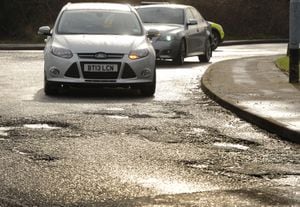Thousands paid out to Telford drivers over pothole damage
A total of 4,610 potholes were reported to Telford & Wrekin Council last year, it has been revealed.

The figures, obtained under the Freedom of Information Act, also revealed that the authority paid out £7,700 in compensation to motorists whose vehicles had been damaged by holes in the road surface.
The numbers, compiled by insurance website Confused.com, come a year after it was revealed that the authority faced a £6.4 million shortfall in its roads maintenance budget.
The research showed that that councils across the UK paid £3.1m in compensation to drivers whose vehicles were damaged by poor road surfaces in 2016.
Local authorities spent an additional £104m repairing potholes.
The figures were obtained following Freedom of Information requests to 412 local authorities. Shropshire and Powys councils did not respond to the request for information.
Councillor Angela McClements, cabinet member for transport at Telford & Wrekin Council, said the authority suffered a major shortfall in Government funding for road maintenance.
“This challenge is made even bigger because, as a new town much of our infrastructure needs repair at the same time,” she said.
“We estimate that to bring all roads in the borough to a high standard would require around £135m in total. Yet the funding for roads and footpaths we get from Department for Transport is just £1.6m a year.”
Councillor McClements said a good road network was vital for the borough’s prosperity, and said the authority had earmarked a further £20m to be spent by 2019 on maintaining the borough’s roads, footpaths and structures.
“This will allow for more proactive maintenance to fix many roads involving large areas of resurfacing and we expect that this will significantly reduce the number of pothole repairs required over the next three years,” she said.
“This investment is however still very far short of what we need and we will continue to work hard to lobby Government to secure fairer funding for the borough,” she said.
The authors of the study estimated that potholes across the UK had a combined depth of more than 24 miles, almost four times deeper than the Pacific Ocean.
A survey of 2,000 motorists also found that one in three had suffered damage to their vehicles due to poor road surfaces, including tyres and suspension problems.
Amanda Stretton, the website’s motoring editor, said: “Scrolling to depths nearly 25 miles really puts the UK’s pothole problem into perspective. They are a major bugbear among drivers, not least because of the damage they do to our vehicles.
“If drivers experience a bump in the road, they should report it to their local council as soon as possible before the problem gets any worse.”
The annual road maintenance survey by the Asphalt Industry Alliance found that local authorities in England and Wales need more than £12bn of funding to bring the road network up to scratch.
This is several times more than councils’ entire annual revenue spending on highways and transport, which was £4.4 billion in England last year.
Across the wider West Midlands region, the study found that a total of 72,462 potholes had been reported to local authorities, giving a combined depth of 1.75 miles – 16 times the depth of the English Channel.
Across Wales, 18,679 potholes were reported, giving a total depth of 2,405ft – about half the height of Mount Snowdon.
Martin Tett, transport spokesman for the Local Government Association, said councils shared the frustration of motorists having to drive on roads that were often inadequate.
“They are doing the best they can in challenging circumstances,” he said.
“Only with adequate funding from central government can local authorities deliver roads for the 21st century.”
A government spokeswoman said the Department of Transport provided councils with record levels of funding improve roads and fix potholes. She said more than £7.1 billion had been earmarked for the next four years.
“It is vital councils spend this cash to keep roads in good condition,” she said.
“We’ve also announced plans for a new major road network that will give councils access to a multi-billion pound fund to improve or replace the most important A-roads in their area.”





